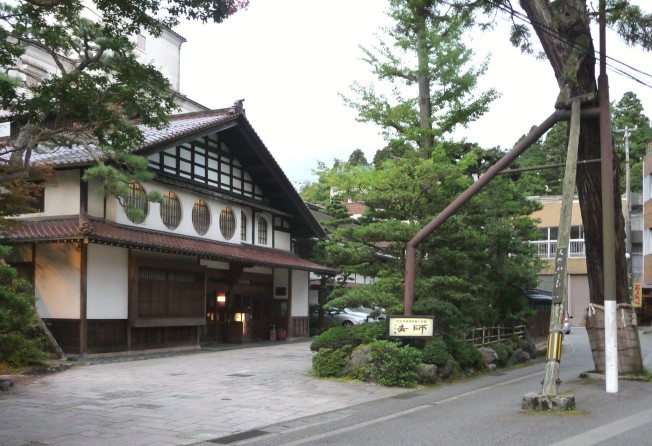Centuries-old Japanese family-owned inn a model for succession
Hoshi Ryokan, managed by members of the founding family since 718, shows how the hospitality company can be passed on for generations

In the picturesque Awazu Onsen district off the northwest coast of Japan is a small inn that is the world's oldest independent family firm.
The Hoshi Ryokan was established in 718 and has been owned and managed by the Hoshi family for almost 1,300 years.
The current owner-manager is Zengoro Hoshi, a member of the 46th generation. Following the death of his eldest son, Hoshi is preparing to transfer the inn to his grandson, who represents the 48th generation of the family.
The name of the family and the inn are closely intertwined, and there is a sense of history in every corner of the property, from the beautiful garden to the famous tea room.
Visitors come to appreciate that the family is the guardian of that history, and Hoshi and his wife are very visible in the hotel, taking an active part in the day-to-day management. The family and its history are clearly central to the unique visitor experience the inn offers.
Hoshi says his business philosophy is to "study the water running down a small current". The water has a drive and from there it continuously improves the stream by moving small obstacles on its way.
Hoshi defines running his inn the same way: the all-important purpose is to provide hospitality and to prepare succession to future generations. These are the two all-dominating purposes of the old inn and beyond that Hoshi and his wife work everyday to remove small obstacles and to continuously improve the hospitality at the inn.
Simple but powerful. Not many family firms today have such a clear vision of the purpose of their business.
One of the defining features of its determination to maintain the family legacy is its preference to pass the business down to eldest sons. In instances where there are no sons, the position is offered to a son-in-law, who is in turn adopted into the family.
Having a clear set of values is essential to aligning the next generation with the last's objectives.
The contribution from the Hoshi family to their inn is an illustrative case of how powerful family assets form the foundation of a successful business strategy. The inn is run based on family ideals.

When Akio Toyoda took over the top position at Toyota Motor in 2009 after almost 17 years with no family member at the helm, it was seen by many outsiders as a clever way to exploit the family name in a situation where Toyota had serious problems with safety issues in their cars, losing credibility among investors.
When the luxury company Hermes - one of the most admired family firms in the world - had to respond to the aggressive investment by Bernard Arnould in late 2010 and early 2011, they chose to replace their long-serving non-family chief executive with a family member to signal the power and unity of the about 70 family members that owned the majority of the iconic firm.
All across Asia, business families have powerful networks that help them in good and bad times. The networks can be purely business but they are often strengthened by bonding families through marriages.
Taejo Wang Gun, who unified Korea, married 29 times to build ties with many dynasties.
Korean conglomerates use marriages to build powerful business networks. Samsung, for example, has marriage networks with Dongbang Corp, Life Corp, Dong-ah Corp, Meewon Corp and LG. LG created a huge business network through marriage with Daelim Corp, Pyeunksan Corp, Kukdong Corp, Doosan Corp, Hyundai, Hanjin and Kumho Corp.
Both Samsung and LG are also connected by family to many politicians and other influential people in Korean society.
Marriages and bonding families are powerful family assets that strengthen Asian family firms.
Succession and transfer of ownership and management is likely to be the biggest challenge in Asian family firms today. Large conglomerates in Hong Kong, mainland China, Singapore and Indonesia suffer during transition. Research has shown that tremendous value is lost when founders or current business stewards grow too old.
Succession is so challenging that many business owners stay on to a very old age. Sir Run Run Shaw recently passed away after a long life in business. He was 103 years old when he retired from Television Broadcasts.
Business families have powerful networks that help them in good and bad times
One major reason why Asian family firms suffer in transition is that they find it challenging to transfer their unique family assets across generations. It may be that the sons and daughters do not share the same values or business talent. Or it could be that the unique network and legacy of the founders could not easily be taken over by the next generation.
The ability to transfer family assets through generations is one of the keys for successful business transfers in Asia. Hence, the first step to long-term planning for any family business is to evaluate the presence and strength of existing assets. Are they important? Are they essential for business strategies today and in the future? How can they be transferred to the next generation?
Family firms in Asia can draw much inspiration from Hoshi and his family, who have been transferring family assets for 1,300 years.
The succession model used for centuries by the Hoshis is tailor-made to transfer the all-important family assets and to reduce potential business risk from an ever-growing family.
In each generation, only one heir will inherit the firm, family wealth and family name. Arranged marriages and adoptions have been used to secure future successors as well as to transfer non-selected children into other families.
These rules may seem blatantly unfair for a modern mind, but Zengoro Hoshi is very candid about their necessity.
They are the cornerstone of a very unique succession model that in the near future will prove it worthwhile for the 46th time.
Generations after generation, the Hoshis have been successfully equipped with the powerful family assets and with them, they have been able to bring the torch forward to continue the amazing story of the little inn with its hot spas and unique hospitality that is globally unique.
Morten Bennedsen is the André and Rosalie Hoffmann chaired professor of family enterprise and the academic director of Wendel International Centre for Family Enterprise at Insead